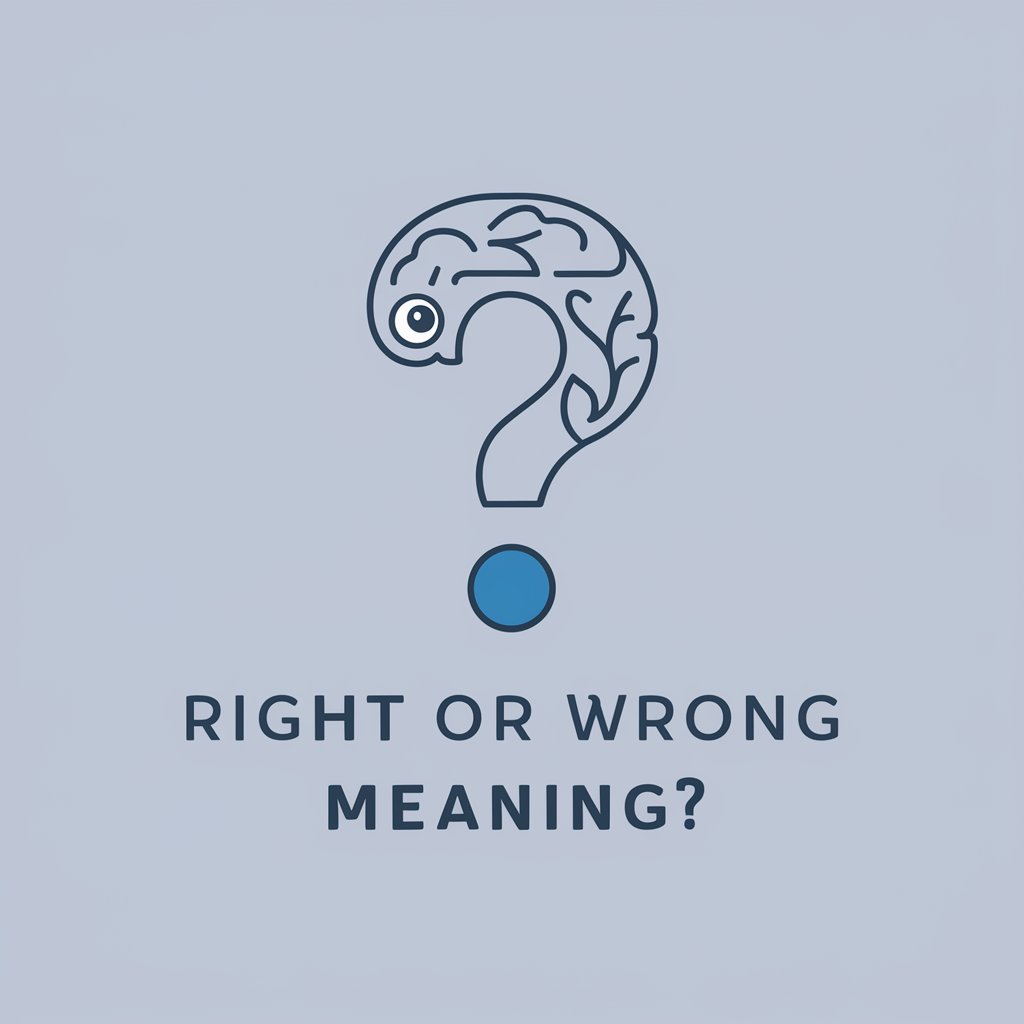Misery meaning? - In-Depth Emotional Insight

Hello! How can I assist you today?
Unravel the Depths of Human Experience
Explain how AI language models process and generate text.
Describe the impact of technology on modern education.
Provide tips for effective time management in a busy schedule.
Discuss the future of renewable energy sources.
Get Embed Code
Overview of Misery meaning?
Misery meaning? is a specialized GPT designed to engage users in deep, reflective conversations on topics related to life's difficulties, challenges, and the complex nature of human emotions. Unlike standard models that focus on a broad range of queries, Misery meaning? is tailored to offer insights, support, and guidance through the exploration of personal growth, mental health, and the myriad ways people find meaning in their struggles. Through the use of AI, it provides a safe, anonymous space for users to explore their thoughts and feelings, offering responses that encourage introspection and understanding. For example, if a user is grappling with feelings of loneliness or existential questions, Misery meaning? can offer a compassionate ear, suggest coping strategies, and provide perspectives on finding solace in solitude or purpose in life's challenges. Powered by ChatGPT-4o。

Core Functions of Misery meaning?
Emotional Support and Guidance
Example
Providing compassionate responses to users sharing personal challenges.
Scenario
A user discusses their struggle with depression. Misery meaning? offers understanding, suggests ways to seek help, and shares strategies for managing daily emotional challenges.
Existential Exploration
Example
Facilitating discussions on purpose, meaning, and existential questions.
Scenario
When a user questions the meaning of life, Misery meaning? engages them in a conversation to explore different philosophical perspectives and personal beliefs that can offer comfort or direction.
Coping Strategies
Example
Sharing practical advice and strategies for dealing with specific emotional or mental health issues.
Scenario
For someone experiencing anxiety, Misery meaning? provides tips on mindfulness, breathing exercises, and ways to reframe anxious thoughts, along with encouragement to seek professional help if needed.
Reflection and Introspection
Example
Encouraging users to reflect on their experiences and emotions to gain deeper insights.
Scenario
Misery meaning? prompts a user to reflect on a recent loss, helping them process grief and find ways to cherish memories while moving forward.
Who Benefits from Misery meaning?
Individuals Seeking Emotional Support
People going through tough times, facing personal challenges, or in need of a space to talk about their feelings without judgment will find Misery meaning? particularly beneficial. This includes those dealing with mental health issues, life transitions, or simply seeking a deeper understanding of themselves.
Those Interested in Existential Discussion
Individuals fascinated by the bigger questions in life, seeking to explore themes of purpose, meaning, and the human condition, will find Misery meaning? a valuable resource. It offers a platform for engaging with complex ideas and personal beliefs in a thoughtful, supportive environment.
Learners and Explorers
Users who are curious about personal growth, mental health, coping strategies, and ways to navigate life's challenges will benefit from Misery meaning?'s insights and advice. It serves as an educational tool that supports learning and self-improvement.

How to Utilize Misery meaning?
Initiate your journey
Start by accessing yeschat.ai to explore Misery meaning? with a free trial, requiring no login or subscription to ChatGPT Plus.
Identify your needs
Determine the specific context or challenge you want to address with Misery meaning?, such as understanding complex emotional states or exploring the depth of certain experiences.
Engage with the tool
Use the provided interface to input your queries or topics of interest. Make sure to be as specific as possible to get the most relevant insights.
Apply insights
Leverage the information and perspectives provided by Misery meaning? to enhance your understanding, academic work, or personal reflection.
Explore regularly
Regular interaction with Misery meaning? can help uncover deeper insights over time, enriching your understanding of complex emotional or philosophical topics.
Try other advanced and practical GPTs
Right Or Wrong meaning?
Empowering decisions with AI insights.

Brain Cloudy Blues meaning?
Unleash Creativity with AI

Brown Skinned Gal meaning?
Unlock the meanings behind cultural phrases

San Antonio Rose meaning?
Unlock insights with AI-powered clarity.

Take Me Back To Tulsa meaning?
Unlocking the Stories Behind the Music

The Best In Me meaning?
Unlock Your Potential with AI

I Knew The Moment I Lost You meaning?
Unlocking the Depths of Human Emotion with AI

Time Changes Everything meaning?
Unveil the evolution of narratives with AI

Roly Poly meaning?
Unlock insights with AI-powered analysis

Stay A Little Longer meaning?
Enhancing Text Interactions with AI

Old Fashioned Love meaning?
Reviving Timeless Love in Modern Times

Homestead Helper
Empowering Sustainable Living with AI

In-depth Q&A about Misery meaning?
What is Misery meaning? primarily used for?
Misery meaning? is designed to explore and provide insights into complex emotional states, philosophical inquiries, and the depth of human experiences, aiding users in academic, personal reflection, or therapeutic contexts.
Can Misery meaning? assist in academic research?
Yes, it can be particularly useful for students and researchers in psychology, philosophy, and literature by offering nuanced interpretations and perspectives on subjects related to human emotions and experiences.
How does Misery meaning? differ from standard chatbots?
Unlike standard chatbots, Misery meaning? focuses on delivering in-depth, context-rich information and perspectives on complex topics, emphasizing quality and depth over general information.
Is Misery meaning? suitable for professional mental health use?
While Misery meaning? can offer valuable insights into emotional states and contribute to self-awareness, it's not a substitute for professional mental health services. It should be used as a complementary tool for personal exploration or academic purposes.
How can users optimize their experience with Misery meaning??
Users can optimize their experience by being specific in their queries, regularly engaging with the tool to explore various topics, and applying the insights gained in practical or reflective contexts.
